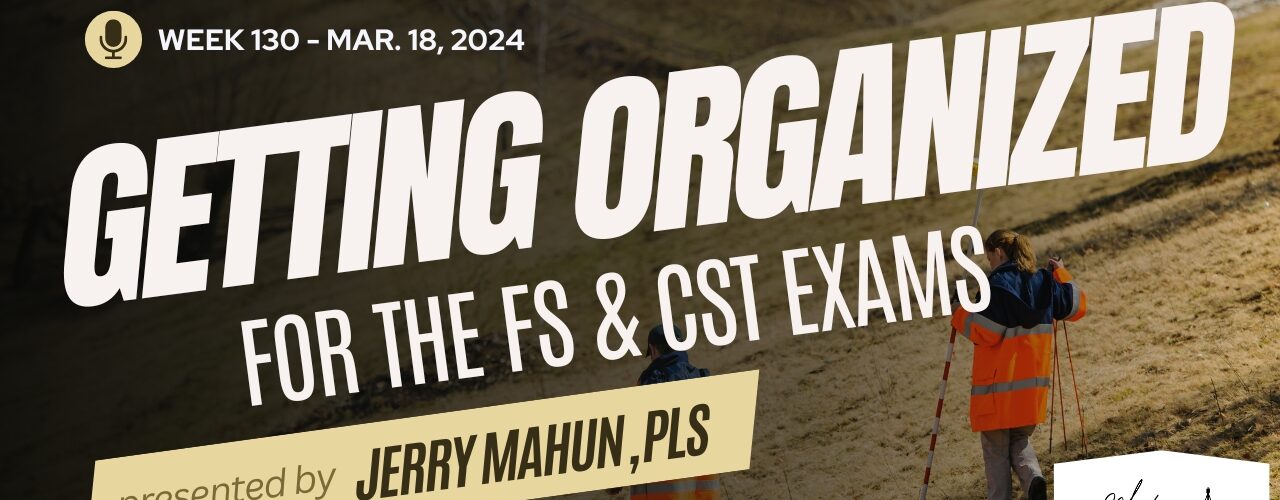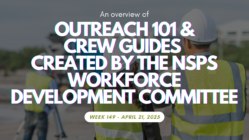Jerry Mahun, PLS, joins us for a presentation on Getting Orgazined for the FS & CST exams.
Meeting Summary: AI-Generated:
| Summary | |
| Casual Discussion on Manufacturing Industry Terminology | |
| Trent and Jerry had a casual discussion with several participants in the waiting room. Trent and Jerry joked about the attendees waiting for their presentation, with Jerry mentioning a future presentation he has for the San Francisco chapters of the California organization. The main discussion revolved around the meaning of “Pk on Pk mail” in the context of the manufacturing industry, with Jerry and Trent providing their insights. Rob also joined the discussion, expressing his frustration about the generic use of “Magna pk nails.” | |
| Preparing for CST and FS Exams | |
| Trent and Jerry discussed the importance of being prepared for CST and FS exams. Trent emphasized the advantage of taking the CST exam before the Ps exam, and Jerry shared his extensive experience and suggested strategies to improve exam readiness. Jerry, with his diverse background, also highlighted the value of his open-access website, which contains his presentations, library, and software, inviting anyone with questions about the POS or CST exams to contact him. The discussion aimed to equip everyone with the necessary tools to tackle upcoming exams more efficiently. | |
| Surveying Exam Requirements and Procedures | |
| Jerry provided a detailed overview of the requirements and procedures for the various surveying exams, including those for the Fundamentals of Surveying (FS), Civil Site Technician (CST), and Professional Surveyor (PS). He explained the differences between these exams and their respective certifications, emphasizing that the FS and PS lead to professional licensure, while the CST is a standalone certification. Jerry also discussed the importance of understanding the exam rules, policies, and procedures, as well as the potential for non-disclosure agreements and complaint procedures. He advised using the exam guide as a primary resource for information and preparation. | |
| Exam Format Changes and FS Reference Handbook | |
| Jerry discussed the changes in the exam format from paper to computer-based, noting that the exam now pulls questions randomly from a pool, resulting in different exams for different candidates. He explained that the exam is not based on a strict 70% passing rate, but rather on a voodoo analysis. Jerry also mentioned that the exam covers seven knowledge areas, each with five to fifteen subtopics. He emphasized the importance of the FS Reference Handbook as the only allowed reference material during the exam and advised candidates to familiarize themselves with its content and nomenclature. Lastly, he outlined the content of the handbook, including sections on abbreviations and acronyms, mathematical and surveying formulas, economics, ethics, safety, and an appendix with various standards. | |
| Preparing for Exams and Building a Professional Library | |
| Jerry discussed the importance of preparing for exams and building a professional library. He suggested using practice exams and reference materials to familiarize oneself with the exam format and content. He also highlighted the differences between the Fs and Cst exams, noting that the Cst exams are more flexible and allow for open book, while the Fs exams have a more structured format. Jerry urged assembling a collection of publications and reference materials, including textbooks and legal books, to assist with exam preparation and future reference. | |
| Staying Updated in Surveying and Photogrammetry | |
| Jerry discussed the importance of keeping up-to-date with technology and textbooks in the fields of surveying and photogrammetry. He recommended recent additions of general surveying and photogrammetry textbooks, as well as boundary principles and legal descriptions books. Jerry also mentioned the use of manual surveying instructions and the history of the rectangular survey system as important resources. He listed a variety of exam resources, including a video course and review materials offered by professional associations and organizations. He emphasized the value of a good professional library and the use of current and updated materials for passing exams. | |
| Educational Resources and Calculator Software | |
| Jerry discussed several educational resources, including an interactive surveying textbook from the Open Textbook Library, a geospatial textbook from Penn State, and an open geospatial textbook from BSU. He also mentioned a collection of self-study problems and examples from his teaching experience. Jerry highlighted the usefulness of the HP 33 s and 35 calculators for exams and shared that he offers software resources for these calculators on his website. Lastly, he referred to the ‘mentoring Mondays’ and ‘Wisdom Wednesdays’ sessions where he and Dane discuss various topics related to surveying and mapping. | |
| Preparing for Exams and C CST Exam | |
| Jerry discussed the importance of identifying one’s weak areas and focusing on them when preparing for exams. He stressed on the significance of understanding the order in which topics should be learned and not just jumping around. Later, Christina asked about the C CST exam, to which Jerry clarified that there’s an application fee and suggested looking at the free material available. Jerry also advised that the exam should only be taken after a thorough self-assessment of one’s academic background. | |
| Academic Background and Consistent Study Habits for Exam Success | |
| Jerry and Trent discussed the importance of academic background and consistent study habits for passing professional exams. Jerry emphasized that having an educational background is crucial for understanding the concepts and ensuring success in the exams. He also highlighted the significance of consistent study habits and active involvement in the learning process to retain the information. The conversation also touched upon the differences in pass rates among first-time takers with and without a college degree. Jerry stressed the need to understand the educational requirements for obtaining multiple state licenses by reciprocity. | |
| Software Programs and Calculator Usage Guide | |
| Jerry and Trent discussed the importance of understanding and correctly using software programs like HP 35. Jerry highlighted the need to learn how to switch out batteries without losing data and emphasized the significance of keeping the calculator’s display showing decimal places and in the correct angle mode. They also stressed the importance of using the correct RPM calculations and not letting the batteries die. Jerry encouraged the use of sketches and neat formatting when working through problems and checking if the answers make sense. Lastly, they advised students to use the reference handbook for the FS exam and to take advantage of mentoring Mondays and the contact spreadsheet for additional help. | |
| Jerry’s Exam Approach and Decompression Strategies | |
| Jerry shared his advice on how to approach exams, emphasizing the importance of not forcing answers and instead answering questions in the order they are presented. He stressed the need to read questions carefully, as they may contain subtle nuances that can alter the meaning. Jerry also advised answering questions based on the information provided, not on personal knowledge or background. He recommended revisiting any difficult questions and not leaving any unanswered. After completing the exam, Jerry suggested reviewing the experience, noting any areas of difficulty or confusion, and comparing these with the actual performance. He encouraged taking some time to decompress after the exam to avoid burnout. Trent did not contribute significantly to the discussion beyond an acknowledgment. | |
| Exam Pass Rates and Study Resources | |
| Jerry and Trent discussed the pass rates of first-time and repeat takers in an exam, noting a significant drop in the latter. They also shared resources for studying, including links to study materials and daily quizzes. They discussed the importance of taking care of calculators and the implications of using the clear memory option. The conversation ended with Jerry offering his assistance to anyone with questions and Trent sharing the upward trend in pass rates for the Fs and Ps exams. | |
| Western Regional Conference and Study Group Plans | |
| Trent shared his plans for the Western Regional Conference and the subsequent scholarship auction, and proposed the idea of setting up a regular online study group. Jerry suggested that retired members could contribute and they discussed the possibility of creating a 20-week program for those preparing for an exam. Christina brought up Ridley College’s new survey program, and it was agreed that further discussion about the study group and the program would take place offline. The conversation ended on a positive note with everyone anticipating the week ahead. | |
| AI-generated content may be inaccurate or misleading. Always check for accuracy. | |







